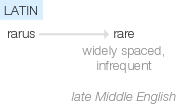Rare
late Middle English (in the sense ‘widely spaced, infrequent’): from Latin rarus .
wiktionary
From Middle English rare, from Old French rare, rere(“rare, uncommon”), from Latin rārus(“loose, spaced apart, thin, infrequent”), from Proto-Indo-European *er(e)-, *rē-(“friable, thin”). Replaced native Middle English gesen(“rare, scarce”) (from Old English gǣsne), Middle English seld(“rare, uncommon”) (from Old English selden), and Middle English seldscene(“rare, rarely seen, infrequent”) (from Old English seldsēne; see seldsome).
From a dialectal variant of rear, from Middle English rere, from Old English hrēr, hrēre(“not thoroughly cooked, underdone, lightly boiled”), from hrēran(“to move, shake, agitate”), from Proto-Germanic *hrōzijaną(“to stir”), from Proto-Indo-European *ḱroHs-(“to mix, stir, cook”). Related to Old English hrōr(“stirring, busy, active, strong, brave”). More at rear.
Variant of rear.
Compare rather, rath.
etymonline
rare (adj.1)
[thin, few, unusual] late 14c., "thin, airy, porous" (opposed to dense); mid-15c., "few in number and widely separated, sparsely distributed, seldom found, very infrequent;" from Old French rer, rere "sparse" (14c.) and directly from Latin rarus "thinly sown, having a loose texture; not thick; having intervals between, full of empty spaces" (antonym of densus). Sometimes reconstructed to be from a PIE root *ere- "to separate; adjoin."
"Having the particles not close together," hence "few in number," hence, "unusual." Sense of "remarkable from uncommonness," especially "uncommonly good" is from late 15c. (Caxton). Related: Rareness. In chemistry, rare earth is from 1818.
Rare implies that only few of the kind exist : as, perfect diamonds are rare. Scarce properly implies a previous or usual condition of greater abundance. Rare means that there are much fewer of a kind to be found than may be found where scarce would apply. [Century Dictionary, 1895]
rare (adj.2)
[undercooked] 1650s, a variant of Middle English rere, from Old English hrere "lightly cooked," probably related to hreran "to stir, move, shake, agitate," from Proto-Germanic *hrorjan (source also of Old Frisian hrera "to stir, move," Old Saxon hrorian, Dutch roeren, German rühren, Old Norse hroera), from PIE root *kere- "to mix, confuse; cook" (source also of Greek kera- "to mix," krasis "mixture").
Originally of eggs, not recorded in reference to meat until 1784, and according to OED, in this sense "formerly often regarded as an Americanism, although it was current in many English dialects ... and used by English writers in the first half of the 19th c."
rare (v.)
"rise up on the hind legs," as a horse, lion, etc., 1833, dialectal variant of rear (v.1). Sense of "eager" (in raring to go) is recorded by 1909. Related: Rared; raring.
